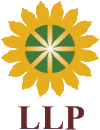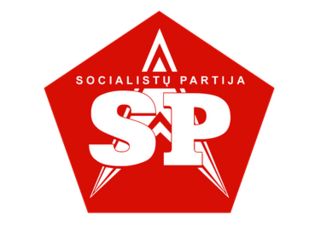
The Lithuanian Soviet Socialist Republic, also known as Soviet Lithuania or simply Lithuania, was de facto one of the constituent republics of the Soviet Union between 1940–1941 and 1944–1990. After 1946, its territory and borders mirrored those of today's Republic of Lithuania, with the exception of minor adjustments to its border with Belarus.
The Social Democratic Party of Lithuania is a centre-left and social democratic political party in Lithuania. Founded as an underground Marxist organisation in 1896, it is the oldest extant party in Lithuania. During the time of the Soviet Union, the party went into exile, emerging once again after the end of communist rule in 1989.
The People's Seimas was a puppet legislature organized in order to give legal sanction the occupation and annexation of Lithuania by the Soviet Union. After the Soviet ultimatum in June 1940, a new pro-Soviet government was formed, known as the People's Government. The new government dismissed the Fourth Seimas and announced elections to the People's Seimas. The elections were heavily rigged, and resulted in a chamber composed entirely of Communists and Communist sympathizers. The new parliament unanimously adopted a resolution proclaiming the Lithuanian Soviet Socialist Republic and petitioned for admission to the Soviet Union as a constituent republic. The Supreme Soviet of the USSR accepted the Lithuanian petition on 3 August 1940. The People's Seimas adopted a new constitution, a close copy of the 1936 Soviet Constitution, on 25 August and renamed itself to the Supreme Soviet of the Lithuanian SSR.

Juozas Ambrazevičius or Juozas Brazaitis, was a resistance fighter who opposed both the Soviet Union and the Nazis. He was a Lithuanian literary historian who became prime minister when the Nazis routed the Soviets from Lithuania. His own ideology and views are disputed.

Zigmas Zinkevičius was a Lithuanian academician, Baltist, linguist, linguistic historian, dialectologist, politician, and the former Minister of Education and Science of Lithuania (1996–1998). Zinkevičius authored over a hundred books, including the popular six-volume "History of the Lithuanian Language" (1984–1994), and over a thousand articles, both in Lithuanian and other languages. He was an academician of the Lithuanian Catholic Academy of Science since 1991 and a full member of the Lithuanian Academy of Sciences from 1990 to 2011, when he became an emeritus member.

The Socialist Party of Lithuania was a left-wing political party in Lithuania. It was founded on March 26, 1994, and briefly had a Member of the Seimas in 1996. It did not achieve any success in elections and merged with the Front Party in 2009 to form the Socialist People's Front.

The Front Party was a socialist political party in Lithuania established in 2008 by Algirdas Paleckis. It participated in the 2008 Lithuanian parliamentary elections but failed to reach the 5% cutoff and sent no members to the Seimas.
The Lithuanian Liberty League or LLL was a dissident organization in the Lithuanian Soviet Socialist Republic and a political party in independent Republic of Lithuania. Established as an underground resistance group in 1978, LLL was headed by Antanas Terleckas. Pro-independence LLL published anti-Soviet literature and organized protest rallies. While it enjoyed limited popularity in 1987–1989, it grew increasingly irrelevant after the independence declaration in 1990. It registered as a political party in November 1995 and participated in parliamentary elections without gaining any seats in the Seimas.

Presidential elections were held in Lithuania in December 1997 and January 1998. Artūras Paulauskas finished first in the first round on 21 December 1997 with a significant margin, with Valdas Adamkus finishing second, but neither received a majority of the vote. Adamkus defeated Paulauskas in the runoff, held on 4 January 1998. With a vote difference of 0.74%, it is the closest result in the history of presidential elections in Lithuania since 1993.

The Lithuanian People's Party is a minor pro-Russian political party in Lithuania. It describes itself as left-of-centre. It was founded in 2010 as a split from the Lithuanian Peasant Popular Union, and was led by the party's former chairman and the first prime minister of independent Lithuania, Kazimira Prunskienė. It has no representatives on the European, national or municipal level.

Algirdas Paleckis is a Lithuanian diplomat, politician, columnist, leader of the political movement The Dawn of Justice. Šiauliai district court convicted Paleckis for spying for Russia in July 2021. The conviction was upheld by the Lithuanian Court of Appeal in May 2022.

Roko maršas was a rock music festival, organized in various cities of Lithuania. It was held in 1987–1989. It was resurrected in 1996 and 1997. The first festivals were organized while Lithuania was still under the Soviet occupation. They became part of the Singing Revolution, spreading ideas of the Lithuanian independence movement among the youth. It helped to awaken the younger generation from Soviet-era apathy and inspire them. In total, the three first festivals attracted an estimated 130,000 spectators. The festivals became a rehearsal for the mass protest rallies by the Sąjūdis that lead to the restoration of Lithuania's independence in March 1990.

Saulius Skvernelis is a Lithuanian politician who served as prime minister of Lithuania between 2016 and 2020. He had previously served as police commissioner, and was Minister of the Interior from 2014 to 2016. Though he was an independent politician, he was backed by the Lithuanian Farmers and Greens Union and was a member of its parliamentary group until 2022, as a result of which he became the first head of government in European history primarily backed by a green party.

Gintautas Paluckas is a Lithuanian politician serving as the 18th prime minister of Lithuania since December 2024. Paluckas served as Deputy Mayor of Vilnius from 2015 to 2019, as the leader of the Lithuanian Social Democratic Party (LSDP) from 2017 to 2021 and has been a member of the Seimas since the 2020 election.

The National Alliance is a Lithuanian far-right political party founded on 7 March 2020 and led by philosopher Vytautas Radžvilas. As of 2024, the party holds two municipal council seats and one seat in Seimas, being represented by its vice-chairman Vytautas Sinica.

The Lithuanian People's Army were short-lived armed forces of Lithuania and the Lithuanian Soviet Socialist Republic following the Soviet occupation of Lithuania in June 1940. The army was formed by the Act of 3 July 1940 of the People's Government of Lithuania and replaced the Lithuanian Armed Forces of independent Lithuania. According to data from 1 June 1940, the army had 28,115 persons – 26,084 soldiers, 2,031 civil servants, and with the announcement of the mobilization it was possible to call 120,400 reserve troops. The army existed until 30 August 1940 before being transformed into the 29th Rifle Corps of the Red Army. Many Lithuanian soldiers and officers were repressed by arrests or executions for their anti-Soviet attitude.
The Vilnius Soviet of Workers Deputies was a soviet (council) in the city of Vilnius. Following end of the First World War on November 11, 1918, a political vacuum emerged in Vilnius, as the German Ober Ost project crumbled. The pro-communist Vilnius Soviet became one of the political forces seeking to govern the city competing with the Lithuanian Taryba and the Polish Samoobrona. A total of 202 deputies were elected to the soviet in December 1918. Whilst the communists formed the largest faction, the Vilnius Soviet was politically diverse. Bundists and communists clashed at the first meeting of the soviet. The soviet also did not welcome the Provisional Revolutionary Workers and Peasants Government of Lithuania headed by Vincas Mickevičius-Kapsukas. As such, new elections were organized after Vilnius was captured by the Red Army on January 5, 1919 during the Soviet westward offensive of 1918–1919. By allowing Red Army soldiers to vote, the communist reinforced their control of the Vilnius Soviet.

The Union of the Working People of Lithuania or Union of Lithuanian Working People was the front organization set up by the Communist Party of Lithuania after the Soviet occupation of Lithuania to take part in the rigged 1940 Lithuanian parliamentary election to the so-called "People's Seimas". The organization ceased to exist as soon as the elections passed.

The Socialist Party is a minor left-wing Marxist political association in Lithuania formed on October 21, 2018, from a split of the Socialist People's Front.















